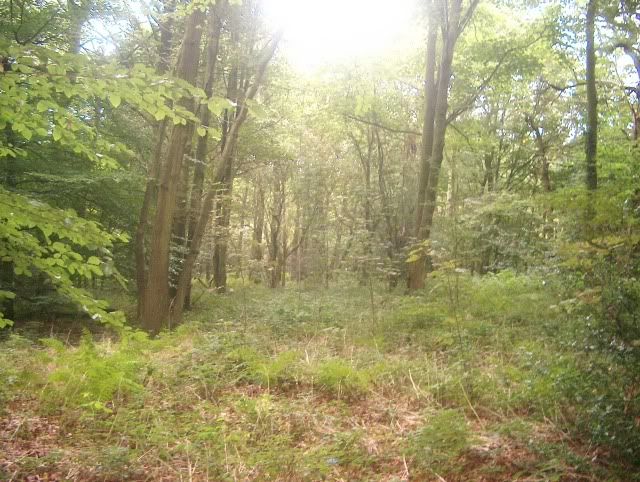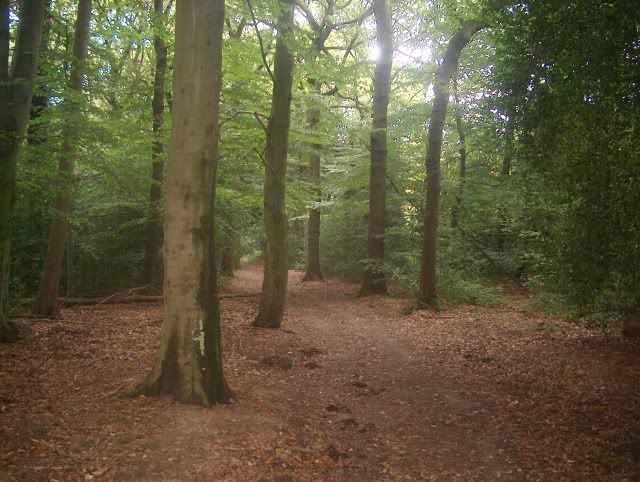----------------------------
10
Psycho
Written by Joseph Stepfano and Samuel A. Taylor; Directed by Alfred Hitchcock

The Producers
Written and directed by Mel Brooks
 Mel Brooks insists that the horrors of the holocaust can be meliorated and alleviated through comedy and satire. He may be right, considering how downright hilarious the song-and-dance 'Springtime for Hitler' routine is. An accountant and a producer realise that they can make more money with a flop than a hit, but if backfires! The script they chose eulogizing Hitler turns out to be a monster hit! Along with The Big Lebowski and Brooks' even sillier outing Blazing Saddles, this is a film I know entirely off by heart.
Mel Brooks insists that the horrors of the holocaust can be meliorated and alleviated through comedy and satire. He may be right, considering how downright hilarious the song-and-dance 'Springtime for Hitler' routine is. An accountant and a producer realise that they can make more money with a flop than a hit, but if backfires! The script they chose eulogizing Hitler turns out to be a monster hit! Along with The Big Lebowski and Brooks' even sillier outing Blazing Saddles, this is a film I know entirely off by heart.
8
The Second Heimat
Written and directed by Edgar Reitz
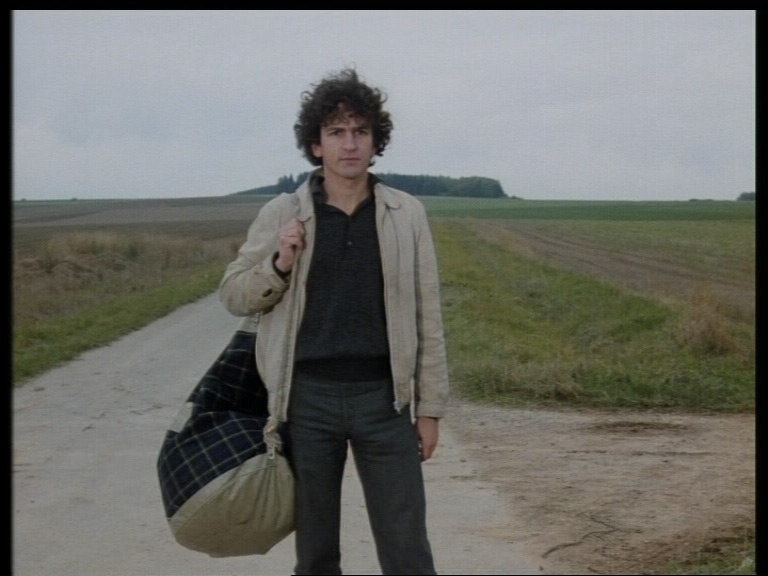 Recently reviewed in my blog, this film has the claim of being the longest picture ever made - clocking in at about 25 hours. But you can also digest it in its television format which is divided across 13 episodes. Set from 1960 until 1970, it follows the young musical prodigy Hermann trying to pursue a career as a composer, meeting several characters in his university studies. The film, like its predecessor, alternates from black and white to colour to achieve a lush and unprecedented artistic effect.
Recently reviewed in my blog, this film has the claim of being the longest picture ever made - clocking in at about 25 hours. But you can also digest it in its television format which is divided across 13 episodes. Set from 1960 until 1970, it follows the young musical prodigy Hermann trying to pursue a career as a composer, meeting several characters in his university studies. The film, like its predecessor, alternates from black and white to colour to achieve a lush and unprecedented artistic effect.
7
The Big Lebowski
Written and directed by Joel Coen and Ethan Coen
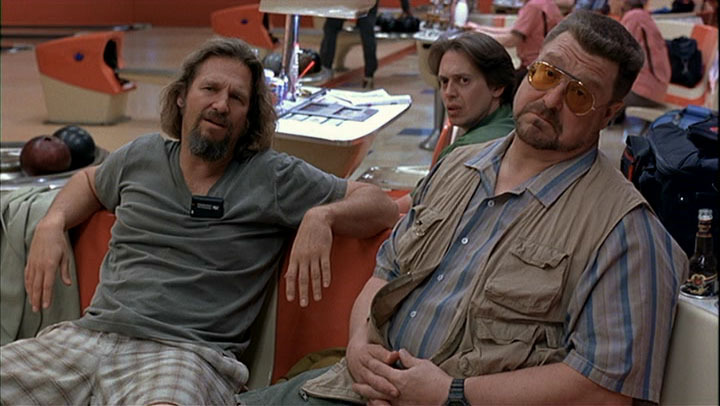
Endlessly watchable, this film follows the life of ageing hippie Jeff 'The Dude' Lebowski who, after getting his rug soiled by some goons, embarks on Chandler-esque plot roughly ignited by the hostage of a pornographic actress by some nihilists, and so much more which is, frankly, confusing and irrelevant. But this film is meant to be confusing, and the underlying storyline is merely a pretext for the highly charismatic central characters to interact. The Coens splice everything in their signature style: Chandler, post-modernism, dream sequences and so much more. A cult classic.
6
Bicycle Thieves
Written by Vittorio De Sica, Cesare Zavattini, Suso Cecchi D'Amico, Gerardo Guerrieri, Oreste Biancoli and Adolfo Franci; Directed by Vittorio De Sica
 One of the central films of Italian Neo-realist cinema, this a truly heart-wrenching portrait of poverty and a struggle to survive. Using amateur actors, it is greatly involving and deeply moving. It is no surprise that the Academy Awards felt compelled to award it with 'Outstanding foreign film' seven years before the existence of the category.
One of the central films of Italian Neo-realist cinema, this a truly heart-wrenching portrait of poverty and a struggle to survive. Using amateur actors, it is greatly involving and deeply moving. It is no surprise that the Academy Awards felt compelled to award it with 'Outstanding foreign film' seven years before the existence of the category.
5
A Man Escaped
Written and directed by Robert Bresson
 Quiet, sparse, contemplative, minimalist.... You know the ending by its title and everything else that occurs in the film, but Bresson manages to overwhelm the viewer with a magnificently restrained style... not to mention the sublime Mozart score.
Quiet, sparse, contemplative, minimalist.... You know the ending by its title and everything else that occurs in the film, but Bresson manages to overwhelm the viewer with a magnificently restrained style... not to mention the sublime Mozart score.
4
Aguirre, The Wrath of God
Written and directed by Werner Herzog
 Herzog's riches achievement, this is a hectic journey into the heart of darkness. Aguirre is a crazed obsessive searching for a futile, doomed quest neither he nor any of his followers are capable of obtaining. Not only is it astonishing to look at in terms of framing, but this is the most important film starring the unforgettable narcissist Klaus Kinsky.
Herzog's riches achievement, this is a hectic journey into the heart of darkness. Aguirre is a crazed obsessive searching for a futile, doomed quest neither he nor any of his followers are capable of obtaining. Not only is it astonishing to look at in terms of framing, but this is the most important film starring the unforgettable narcissist Klaus Kinsky.
3
Alphaville
Written and directed by Jean-Luc Godard
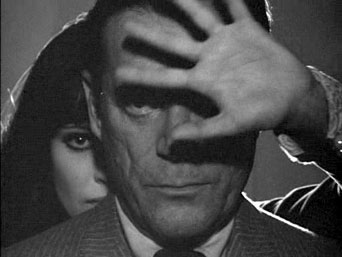 Lemmy Caution enters the topsy-turvy world of Alphaville, where everything is seemingly different. The concept of the individual has been lost, and anyone speaking up is murdered in strange ways. Also, dictionaries are bibles, love is replaced by sensuality, women are bar-coded and words are replaced.... Far stranger than anything in1984. There are allusions to everything under the sun, although these can go over your head and won't hinder the enjoyment of the film. The best segments from the film are often the confrontations the protagonist has with Alpha 60, a computer which gives Borgesian monologues about time and space.
Lemmy Caution enters the topsy-turvy world of Alphaville, where everything is seemingly different. The concept of the individual has been lost, and anyone speaking up is murdered in strange ways. Also, dictionaries are bibles, love is replaced by sensuality, women are bar-coded and words are replaced.... Far stranger than anything in1984. There are allusions to everything under the sun, although these can go over your head and won't hinder the enjoyment of the film. The best segments from the film are often the confrontations the protagonist has with Alpha 60, a computer which gives Borgesian monologues about time and space.
2
Blue Velvet
Written and directed by David Lynch
 This is a film which shows the underlying darkness fervidly thriving beneath the superficial calmness and tranquility of suburbia. The gateway into this underworld is a severed ear...
This is a film which shows the underlying darkness fervidly thriving beneath the superficial calmness and tranquility of suburbia. The gateway into this underworld is a severed ear...
1
2001: A Space Odyssey
Written by Stanley Kubrick and Arthur C. Clarke; Directed by Stanley Kubrick
 Astounding sets that awe the viewer as much now as they did in 1969; astounding classical music, both modern and romantic; an astounding ending which is open to interpretation; and the monolith.... This is far more than a mere science fiction movie, this is dazzling.
Astounding sets that awe the viewer as much now as they did in 1969; astounding classical music, both modern and romantic; an astounding ending which is open to interpretation; and the monolith.... This is far more than a mere science fiction movie, this is dazzling.
Psycho
Written by Joseph Stepfano and Samuel A. Taylor; Directed by Alfred Hitchcock

No matter how endlessly emulated or talked-about, you can never escape the sheer brilliance of that shower scene and the scintillating Bernard Hermann score... The neurotic protagonist is brilliant and disturbing, and Hitchcock's psychological revelations towards the end of the film are subtly suggested throughout the rest of the film.
9The Producers
Written and directed by Mel Brooks
 Mel Brooks insists that the horrors of the holocaust can be meliorated and alleviated through comedy and satire. He may be right, considering how downright hilarious the song-and-dance 'Springtime for Hitler' routine is. An accountant and a producer realise that they can make more money with a flop than a hit, but if backfires! The script they chose eulogizing Hitler turns out to be a monster hit! Along with The Big Lebowski and Brooks' even sillier outing Blazing Saddles, this is a film I know entirely off by heart.
Mel Brooks insists that the horrors of the holocaust can be meliorated and alleviated through comedy and satire. He may be right, considering how downright hilarious the song-and-dance 'Springtime for Hitler' routine is. An accountant and a producer realise that they can make more money with a flop than a hit, but if backfires! The script they chose eulogizing Hitler turns out to be a monster hit! Along with The Big Lebowski and Brooks' even sillier outing Blazing Saddles, this is a film I know entirely off by heart.The Second Heimat
Written and directed by Edgar Reitz
 Recently reviewed in my blog, this film has the claim of being the longest picture ever made - clocking in at about 25 hours. But you can also digest it in its television format which is divided across 13 episodes. Set from 1960 until 1970, it follows the young musical prodigy Hermann trying to pursue a career as a composer, meeting several characters in his university studies. The film, like its predecessor, alternates from black and white to colour to achieve a lush and unprecedented artistic effect.
Recently reviewed in my blog, this film has the claim of being the longest picture ever made - clocking in at about 25 hours. But you can also digest it in its television format which is divided across 13 episodes. Set from 1960 until 1970, it follows the young musical prodigy Hermann trying to pursue a career as a composer, meeting several characters in his university studies. The film, like its predecessor, alternates from black and white to colour to achieve a lush and unprecedented artistic effect.7
The Big Lebowski
Written and directed by Joel Coen and Ethan Coen

Endlessly watchable, this film follows the life of ageing hippie Jeff 'The Dude' Lebowski who, after getting his rug soiled by some goons, embarks on Chandler-esque plot roughly ignited by the hostage of a pornographic actress by some nihilists, and so much more which is, frankly, confusing and irrelevant. But this film is meant to be confusing, and the underlying storyline is merely a pretext for the highly charismatic central characters to interact. The Coens splice everything in their signature style: Chandler, post-modernism, dream sequences and so much more. A cult classic.
Bicycle Thieves
Written by Vittorio De Sica, Cesare Zavattini, Suso Cecchi D'Amico, Gerardo Guerrieri, Oreste Biancoli and Adolfo Franci; Directed by Vittorio De Sica
 One of the central films of Italian Neo-realist cinema, this a truly heart-wrenching portrait of poverty and a struggle to survive. Using amateur actors, it is greatly involving and deeply moving. It is no surprise that the Academy Awards felt compelled to award it with 'Outstanding foreign film' seven years before the existence of the category.
One of the central films of Italian Neo-realist cinema, this a truly heart-wrenching portrait of poverty and a struggle to survive. Using amateur actors, it is greatly involving and deeply moving. It is no surprise that the Academy Awards felt compelled to award it with 'Outstanding foreign film' seven years before the existence of the category.5
A Man Escaped
Written and directed by Robert Bresson
 Quiet, sparse, contemplative, minimalist.... You know the ending by its title and everything else that occurs in the film, but Bresson manages to overwhelm the viewer with a magnificently restrained style... not to mention the sublime Mozart score.
Quiet, sparse, contemplative, minimalist.... You know the ending by its title and everything else that occurs in the film, but Bresson manages to overwhelm the viewer with a magnificently restrained style... not to mention the sublime Mozart score.Aguirre, The Wrath of God
Written and directed by Werner Herzog
 Herzog's riches achievement, this is a hectic journey into the heart of darkness. Aguirre is a crazed obsessive searching for a futile, doomed quest neither he nor any of his followers are capable of obtaining. Not only is it astonishing to look at in terms of framing, but this is the most important film starring the unforgettable narcissist Klaus Kinsky.
Herzog's riches achievement, this is a hectic journey into the heart of darkness. Aguirre is a crazed obsessive searching for a futile, doomed quest neither he nor any of his followers are capable of obtaining. Not only is it astonishing to look at in terms of framing, but this is the most important film starring the unforgettable narcissist Klaus Kinsky.Alphaville
Written and directed by Jean-Luc Godard
 Lemmy Caution enters the topsy-turvy world of Alphaville, where everything is seemingly different. The concept of the individual has been lost, and anyone speaking up is murdered in strange ways. Also, dictionaries are bibles, love is replaced by sensuality, women are bar-coded and words are replaced.... Far stranger than anything in1984. There are allusions to everything under the sun, although these can go over your head and won't hinder the enjoyment of the film. The best segments from the film are often the confrontations the protagonist has with Alpha 60, a computer which gives Borgesian monologues about time and space.
Lemmy Caution enters the topsy-turvy world of Alphaville, where everything is seemingly different. The concept of the individual has been lost, and anyone speaking up is murdered in strange ways. Also, dictionaries are bibles, love is replaced by sensuality, women are bar-coded and words are replaced.... Far stranger than anything in1984. There are allusions to everything under the sun, although these can go over your head and won't hinder the enjoyment of the film. The best segments from the film are often the confrontations the protagonist has with Alpha 60, a computer which gives Borgesian monologues about time and space.Blue Velvet
Written and directed by David Lynch
 This is a film which shows the underlying darkness fervidly thriving beneath the superficial calmness and tranquility of suburbia. The gateway into this underworld is a severed ear...
This is a film which shows the underlying darkness fervidly thriving beneath the superficial calmness and tranquility of suburbia. The gateway into this underworld is a severed ear...1
2001: A Space Odyssey
Written by Stanley Kubrick and Arthur C. Clarke; Directed by Stanley Kubrick
 Astounding sets that awe the viewer as much now as they did in 1969; astounding classical music, both modern and romantic; an astounding ending which is open to interpretation; and the monolith.... This is far more than a mere science fiction movie, this is dazzling.
Astounding sets that awe the viewer as much now as they did in 1969; astounding classical music, both modern and romantic; an astounding ending which is open to interpretation; and the monolith.... This is far more than a mere science fiction movie, this is dazzling.Runners-up: Pulp Fiction by Quentin Tarantino; Branded to Kill by Seijun Suzuki; A Clockwork Orange by Stanley Kubrick; Citizen Kane by Orson Welles; Annie Hall by Woody Allen; The Discreet Charm of the Bourgeoisie by Luis Bunuel; Videodrome by David Cronenberg; Vivre Sa Vie by Jean-Luc Godard; Barton Fink by the Coen Brothers.
-------------
For some fucked up reason, I can't get the font I want when I list the directors for each film... It appears correctly when I type it up as a draft here, but when I post it it keeps fucking up! Frustrating....
-------------
For some fucked up reason, I can't get the font I want when I list the directors for each film... It appears correctly when I type it up as a draft here, but when I post it it keeps fucking up! Frustrating....



